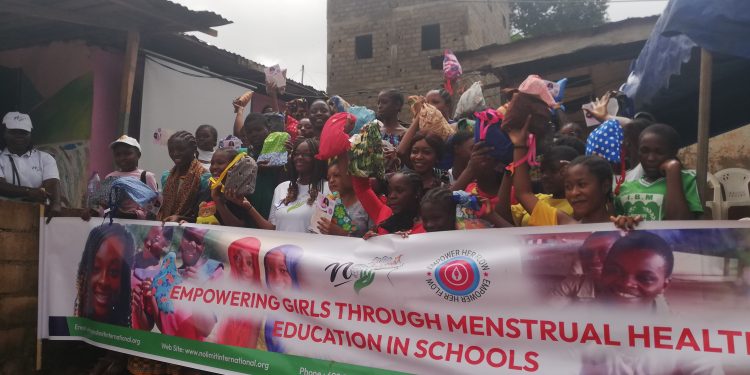Story, Louvier Kindo Tombe
Prissy was moving around that Saturday, November 18, 2023 at the Cite Verte neighborhood in Yaounde, political capital of Cameroon, when she noticed some young girls gathered and listening to a lady standing in front of them. She was curious. As she moved closer, the message became clear. It was a discussion on menstrual education.
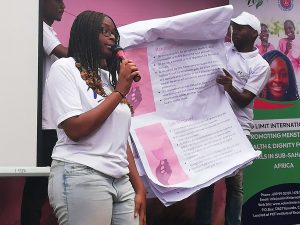
“Menstruation is not a dirty word”, the lady spoke in a subtle voice, as she presented a chart to the young girls. But for girls like Prissy, 13, the word “menstruation” is spoken only in hushed whispers between senior pupils in her school.
Prissy attends class in one of the urban primary schools in the Yaounde II municipality. She likes writing stories and gets high points in English, which is her favourite subject. She dreams of becoming a lawyer someday.
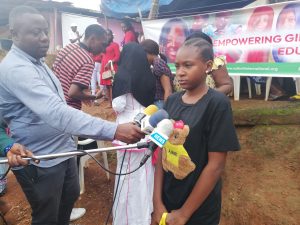
Menstruation is commonly known as a period. When you menstruate, your uterus lining sheds and flows out of your vagina. Your period contains blood, mucus and some cells from the lining of your uterus. The average length of a period is three to seven days.
Despite being a normal biological process, menstruation remains to be a taboo subject in some parts of Cameroon and is not talked about openly especially in the presence of boys and men. This contributes to the poor or lack of basic knowledge of menstruation and how to manage it among women and girls.
Unprepared for their first menstrual bleeding, girls like Prissy rely on older female relatives, who are not knowledgeable themselves, for support and advice. Moreover, poor access to affordable sanitary hygiene products compels some girls to use homemade materials, which are often ineffective in preventing leakages.
The discussion around menstrual education was interesting that Prissy decided to join. It was organised by a non profit organization, “No Limit International”.
“I enjoy speaking to these girls. My goal is to act as an elder sister to guide them through their menstrual period,” Orlyanka Tantchou, founder of No Limit International told News Upfront.
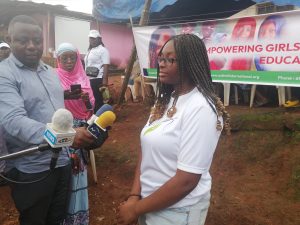
No Limit International is working to make an impact and improve living conditions in vulnerable communities in Sub Saharan Africa. The Yaounde visit was a trip to promote menstrual dignity for all girls in the country. During the discussion in Cite Verte, the girls were told how to notice their menstrual period and how to manage challenges that usually come with it.
“People always make fun and gossip about girls who get stains on their skirts,” Prissy said. She recalled a time when one of her classmates had her period at school. All the pupils, especially the boys, were pointing at her and laughing. At that time, “I didn’t have my period yet, so I didn’t think much of it”, she added.
“We can’t be ashamed of our menstrual period, it can’t stop us from going to school,” Orlyanka Tantchou told the young girl, calling on them to strive to be courageous, capable, intelligent, confident, and leaders among their peers.
“Today we learned about how to use the sanitary pads, changing it constantly to avoid stains” Nadege, another young girl who attended the education and sensitization discussions told this reporter.
No Limit International donates to the underprivileged
Across the globe, the World Bank says that at least 500 million women and girls lack access to the facilities they need during their periods. UN Women reckons that 1.25 billion women and girls worldwide have no safe, private toilet to go to in school. The situation in Sub Saharan Africa is preoccupying. That explains why the organization opted to assist the young, underprivileged girls with menstrual kits during their visit to Cite Verte.
“Am always happy to help my little sisters,” Orlyanka Tantchou said.
The menstrual kits distributed to each of the over 50 young girls present contained a reusable menstrual pads, and a menstrual cup including other sanitary materials.
“I want to thank this sister for the gifts she gave to me, that as I use them and be happy, let God continue to bless her and let her organization continue to prosper,” one of the beneficiary girls told News Upfront.
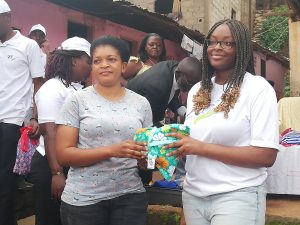
Worth noting is the fact that officials from the Yaounde II council were present to grace the event. One of the municipal councillors, DUTRION Julienne, saluted the initiative from No Limit International and promised that the council will in one way or the other, support the vision of its founder.
“What interests me is the zeal for a young girl to engage in the health of her peers and juniors especially,” Madam DUTRION Julienne said.
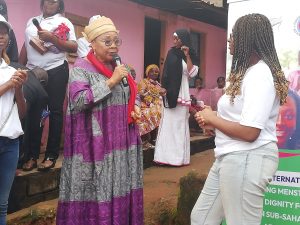
The founder of the organization said, she will not relent, until girls are able to write their own life stories regardless of their culture, religion, location, or ethnicity, and education is the only way. She intends to remove barriers and aim for a brighter future for the next generation of women leaders by championing the female agenda in Sub Saharan Africa and beyond.
